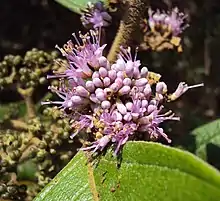| Callicarpa tomentosa | |
|---|---|
 | |
| Scientific classification | |
| Kingdom: | Plantae |
| Clade: | Tracheophytes |
| Clade: | Angiosperms |
| Clade: | Eudicots |
| Clade: | Asterids |
| Order: | Lamiales |
| Family: | Lamiaceae |
| Genus: | Callicarpa |
| Species: | C. tomentosa |
| Binomial name | |
| Callicarpa tomentosa (L.) L. | |
| Synonyms[1] | |
| |
Callicarpa tomentosa is a species of beautyberry plant in the family Lamiaceae. It is found in Western Ghats of India and Sri Lanka. It is a small tree with about 5m tall. Leaves simple, opposite; elliptic to broadly elliptic; apex acute or acuminate. Purplish flowers show branched axillary cymes. Fruit is 3-4 seeded globose drupe.[2] Fruits provide food for wildlife. They are sometimes used to make herbal medicine. The leaves are also food for wildlife.[3]
The leaf is known being used as a wick to light an oil lamp.[4]
In Hinduism, it is said in the legends that when the pandavas went to exile, they lit the tree by applying oil to the leaves and burning them.[5]
Common Names
- Sanskrit - Priyangu
- Marathi - Jhijhak
- Tamil - kattu-ke-kumil
- Telugu - bodiga chettu
- Kannada - Pandavara Batti
References
- ↑ "Callicarpa tomentosa (L.) L. — the Plant List". Archived from the original on 2019-07-18. Retrieved 2015-06-12.
- ↑ "Callicarpa tomentosa - VERBENACEAE".
- ↑ Pharmcographia indica
- ↑ "The leaf that lit the pandavas' path through the forest". Deccan Chronicle. Deccan Chronicle. 17 April 2016. Retrieved 14 March 2022.
- ↑ "The secret of Pandavara Batti used as torch by Pandava during exile". www.plantsinformation.com. Retrieved 2022-10-23.
This article is issued from Wikipedia. The text is licensed under Creative Commons - Attribution - Sharealike. Additional terms may apply for the media files.